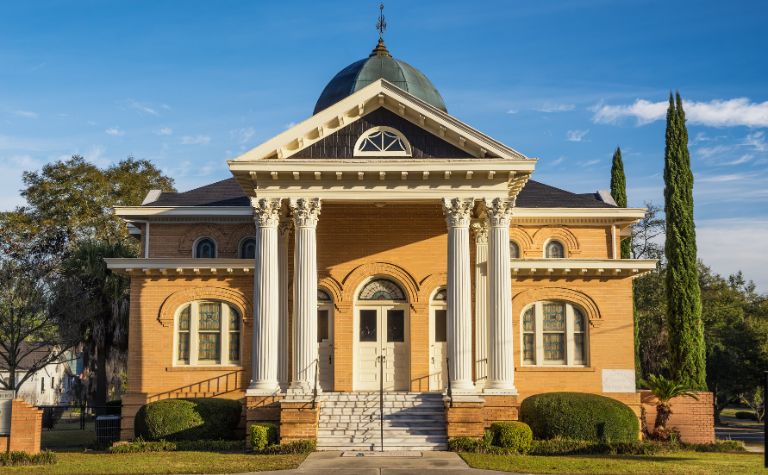Presbyterianism has been one of the most prominent branches of Protestant Christianity for 500 years. Calvinism has been one of the most influential theological belief systems in the last 500 years. These facts have led people to wonder what the relationship between Presbyterianism and Calvinism is.
Presbyterians are historically Calvinists in their theology. Some churches within the tradition have embraced doctrinal and social liberalism in recent decades, leading them away from their heritage. Presbyterians haven’t always agreed on every detail of Calvinism and its application today.
Why are Presbyterianism and Calvinism so intricately related? Do any Presbyterian churches have non-Calvinist beliefs? Do any non-Presbyterian churches have Calvinist beliefs? Keep reading to learn more.
Also, see Presbyterian vs. Roman Catholic: What’s the Difference? to learn more.

The Relationship Between Presbyterianism and Calvinism
John Calvin (1509-1564) was the leader of the Protestant Reformation in France, though his influence eventually extended into all of Europe, North America, and beyond. His classic work, The Institutes of the Christian Religion, is his most well-known theological teaching.
Calvin also wrote Bible commentaries on almost every book of the Old and New Testaments. Calvin’s sermons and lectures also impacted Protestant Christianity. (Also see Presbyterian vs. Pentecostalism: What’s the Difference?)
Presbyterianism: The name “Presbyterian” describes a form of church government. People sometimes use the term broadly today to describe a theological system or an individual church member in the tradition. Yet, the definition of the word refers to ecclesiastical governance.
The foundational conviction of Presbyterian church governance is that elders are to be representatives of the church who serve in a ranked structure. Presbyterian government is often contrasted with Congregationalism and Episcopalianism. Presbyterian regional governance is generally organized as follows:
- A group of elders in a specific geographical area form a presbytery.
- A group of presbyteries forms a synod.
- A group of synods forms a General Assembly.
| Term | Meaning |
|---|---|
| Calvinism | Refers to the theological teaching of French Reformer John Calvin, commonly expressed with the acronym T.U.L.I.P.* |
| Presbyterianism | Refers to a form of church government that centers on local and regional elders |
| Reformed | Sometimes refers broadly to the theology of the Protestant Reformation; other times, it’s used as a synonym for Calvinism; still other times, it’s used to describe the doctrines of T.U.L.I.P. as well as classic Reformed beliefs such as Covenant Theology |
Though Calvin didn’t create the acronym T.U.L.I.P., people often use it to summarize his theology. The letters stand for:
- Total Depravity
- Unconditional Election
- Limited Atonement
- Irresistible Grace
- Perseverance of the Saints
Calvin Argued For the Presbyterian Form of Church Governance
Calvin believed that the Bible teaches Presbyterian church governance. He reasoned that the structure best enabled the Church to carry out its ministry with Jesus Christ as its head.
Many Reformers also believed that Presbyterian governance is modeled in the New Testament, which aligned with the movement’s emphasis on re-establishing the Bible as the Church’s sole authority, in contrast to the theology of Catholicism.
Calvin writes a lot about Presbyterian governance in The Institutes. He is persuaded that this structure is biblically-based: “Now we must speak of the order by which the Lord willed his church to be governed. He alone should rule and reign in the church as well as have authority or preeminence in it, and this authority should be exercised and administered by his Word alone.” (Institutes, iii. 1, emphasis added)
Calvin believed that other forms of church governance had the potential to do more harm than good. Alternative forms of oversight would likely diminish the centrality of the Bible, blunt the ministry of baptism and the Lord’s Supper, and render pastoral care less effective.
In summary, Presbyterian governance, to Calvin, maximized the Church’s purpose: “This human ministry which God uses to govern the church is the chief sinew by which believers are held together in one body. Whoever, therefore, either is trying to abolish this order of which we speak and this kind of government or discounts it as not necessary, is striving for the undoing or rather the ruin and destruction of the church.” (Institutes, iii. 2)
Not all forms of church governance employed today were in operation in Calvin’s time. Some speculate that perhaps Calvin wouldn’t have so strongly rejected some modern forms of governance. After all, in historical context, Calvin was arguing against the governance model found in Catholicism.
However, based on his teaching in The Institutes, it seems that Calvin didn’t need to be aware of all forms of governance because he believed that the Bible taught Presbyterian governance, and that settled the matter.
Many Reformed thinkers today wouldn’t go so far as to say that non-Presbyterian models of governance are “unbiblical” even while holding to Presbyterian governance themselves. (Also see Do Presbyterians Believe in the Trinity?)

What Offices Comprised Church Governance for Calvin?
Calvin identified three offices in the church: We have stated that Scripture sets before us three kinds of ministers. Similarly, whatever ministers the ancient church had, it divided into three orders. From the order of presbyters,
(1) part were chosen, pastors and teachers;
(2) the remaining part was charged with the censure and correction of morals;
(3) the care of the poor and the distribution of alms were committed to the deacons (iv. 1).
Calvin believed that the New Testament uses the words bishop, presbyter, pastor, and minister interchangeably. (Institutes, iii. 8).
Did John Knox Establish the Presbyterian Denomination?
John Knox (1513-1572), a Protestant Reformer in Scotland, played an important role in establishing the Presbyterian tradition. Many church historians credit Knox with building on Calvin’s foundation regarding Presbyterian governance. (Also see Presbyterians vs. Puritans: What’s the Difference?)
Can a Church Be Presbyterian But Not Be Calvinist?
A church can have Presbyterian governance without fully embracing Calvinist theology. Calvin’s teaching on church governance will have (perhaps indirectly) influenced it, even if the leadership and membership reject certain doctrines historically common to Calvinism.
Some argue that modern liberal denominations like the PCUSA are Presbyterian in structure. Still, they have rejected their historical roots, so they can no longer be considered Calvinists in theology. (Also see the full article, Are Calvinists and Presbyterians the Same?)

Can a Church Be Calvinist Without Being Presbyterian?
It’s common for a church to have non-Presbyterian governance while embracing Calvinist theology. Some would argue that such churches aren’t fully “Reformed” because they often don’t hold to certain Reformed doctrines related to biblical covenants and congregational worship.
Yet these churches can be called “Calvinist” because they follow his teaching in matters of sin, atonement, and salvation. (Presbyterian vs. Reformed: What’s the Difference?)
Reformed Baptist churches have non-Presbyterian governance yet embrace Calvinist theology. For reasons cited above, some Reformed thinkers may believe that “Calvinist Baptist” is a more accurate description. Nevertheless, they are commonly called “Reformed Baptists.”
Some churches are considered “Calvinist Methodist,” such as the Presbyterian Church of Wales. In the early 19th century, members of this tradition rejected Arminian teaching and embraced Calvinism. The tradition was the product of the Welsh Methodist revival.
Many non-denominational churches also have Calvinist theology.
References:
[1] Source
[2] Source
[3] Source
Related Questions
The Roman Catholic and Presbyterian branches of the Christian faith trace their origins to Jesus of Nazareth and his apostles, as well as their writings that comprise most of the New Testament. There...
The Presbyterian and Methodist traditions have been two of the most prominent branches of Protestant Christianity over the last 500 years. Each has a strong tradition of biblical preaching,...
